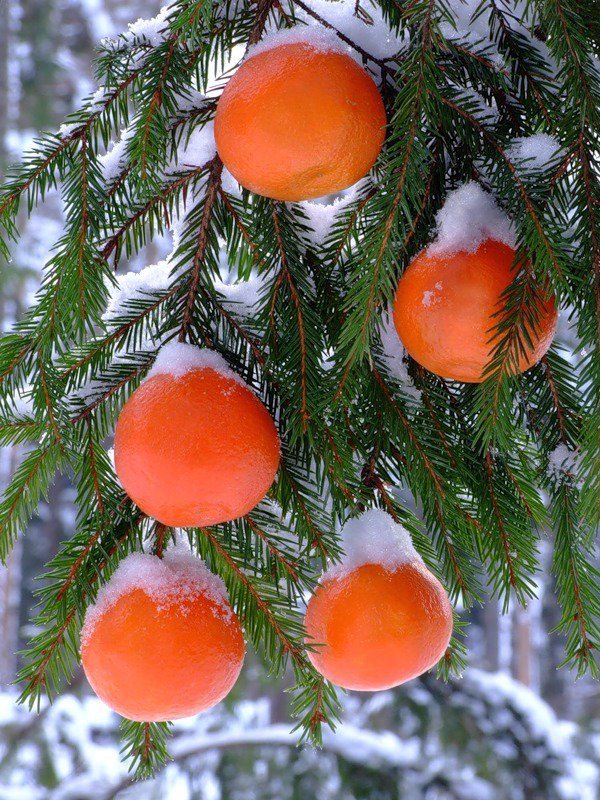For most Americans, the holidays smell like spices and gingerbread cookies.
For myself, like for many born in the former Soviet Union, the holidays will always smell like mandarin oranges.
In a country where bread lines were real, mandarin oranges in the middle of harsh Russian winter, imported from somewhere warm and exotic, were a treat, saved for kids’ most thrilling night of the year. Wrapped in gold foil, they were hung up on the tree, to be discovered on New Year’s morning. The tingly scent will always flood me with the joy of those mornings, and the excitement of the holiday – singular, as in the New Year; the only winter holiday that truly existed for our generation.
In theory, there was Orthodox Christmas – but a few devout followers aside, it has largely been discarded with the Communists’ anti-religious regimes. Instead, the New Year became the designated day of family dinners, ornamented trees, and Grandpa Frost, aka Russian Santa. Religion did not exist in the USSR – while it was no longer a cause for prosecution, it simply ceased to be a part of people’s lives. I grew up without the concept of God; not by any conscious choice, but by osmosis.
When I turned seven, all that changed. We landed in Israel, courtesy of my mother’s Jewish roots, only to realize that here, getting away from religion was not an option. The country forced its beliefs on us brutally. Stores and public transit didn’t operate on Saturdays; wheat products weren’t sold anywhere for the week of Passover; and classmates ostracized me when, naively, I showed to lunch with a bologna sandwich on buttered bread, a decidedly non-kosher combo. More importantly, any mention of Christmas or New Year’s was strictly frowned upon. The Jewish calendar had Hanukkah and its own New Year; everything else was relegated to evil Christianity, not to be spoken of. Even plus signs in math were converted to upside-down ‘T’s, so as not to resemble the cross. It was that serious.
Not wanting to arouse judgement, and with no Christmas trees to be found, my New Year’s presents were now deposited quietly under a vase of cut fir branches that we threw some tinsel on. At the same time, we began timidly dabbling in local traditions. We lit candles on Hannukah, ate matzah, and dipped apples in honey on Rosh Hashanah. My mom led the way, remembering suddenly the Shabbats and gefilte fish of her Jewish grandmother in Moldova. I watched many friends, immigrant kids like myself, enthusiastically buy into this newfound culture; going so far as to instill religious rites in their homes, despite their parents’ bewildered resistance.
I, however, never fully accepted this religious state; perhaps because I resented being pushed into it without my input, I stayed skeptical. For five years, I rolled my eyes discreetly as we studied the mandatory Torah in school, and indulged happily in bacon in the safety of home, from back-alley Russian markets that have sprouted up to serve immigrants like ourselves.
Then, Canada. I remember coming into a supermarket and seeing the international food aisles: there were the familiar matzahs and Israeli grape juice, next to a display of Easter eggs and strange ingredients with Chinese-character labels. Together, they looked like freedom. No one cared what you bought, it suddenly dawned on me. No one would judge what you celebrated, what you ate, or what you believed in – or didn’t. The thought was liberating, a relief. Our years in Israel had always been shadowed with secret: eating our contraband Russian-store pork; eschewing childhood rituals; pretending to believe along with everyone else, so as not to be subject to overt disapproval, or worse.
The choice was finally mine alone.
Twenty years later, my mother still lights Hanukkah candles, a tradition she kept from our former lives. I, however, have mainly drifted away from these Jewish customs. Nor have I adapted new ones, at least not with any flavor of religion. Here in our city, the diversity of ethnicities and cultures is beautiful; yet Catholic church seems to be a more prominent presence in people’s lives than it was back in Canada, and the holidays revolve around religious services for many. But not us.
I do believe: I believe in being a good person, and in doing good, and these are the beliefs we try to instill in our boys. Hearing of conflict in the world spurred by organized religion, I remember my anxious Israeli years, and think: if there is a God, it surely isn’t one who would punish us for what we do or do not put on our plates. In our home, the holidays – which now mean both a traditional North American Christmas and Russian-style New Year’s – are not about God or celebrating a holy birth. They’re about little excited feet pounding down stairs in the morning; about delicious food, and laughing at old family jokes, and visits from Santa and his Russian cousin.
They’re about mandarin oranges.

